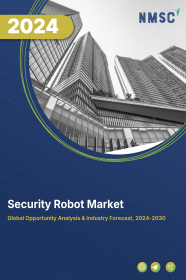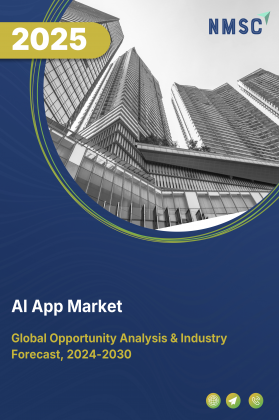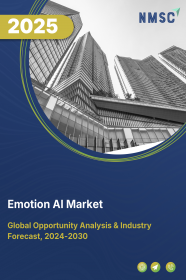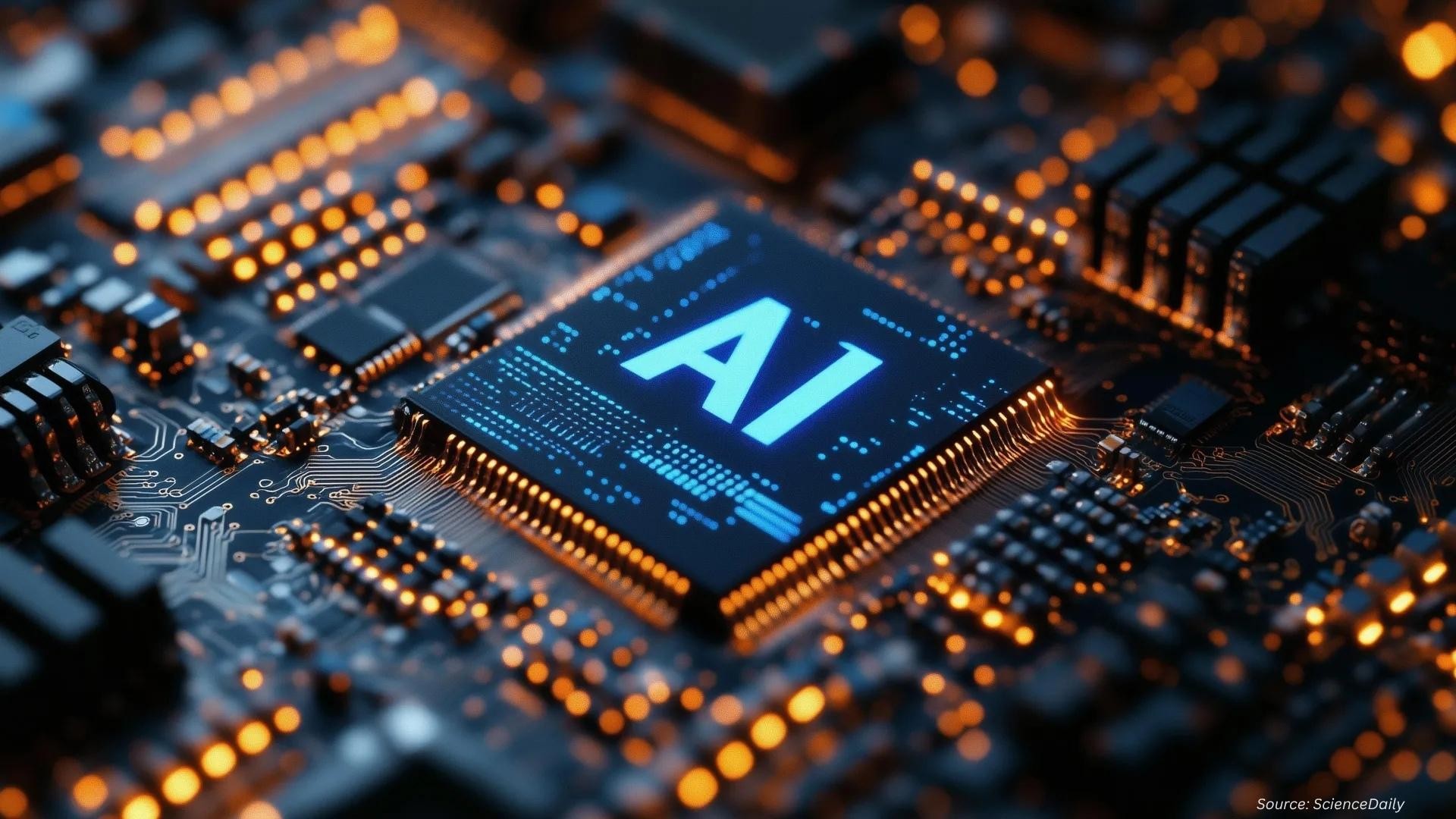
Security Robot Market by Component (Frames, Sensors, Controller System, Camera System, Navigation System, Power System), by Type (UAV, UGV, and UUV), by Applications (Spying, Explosive Detection, Firefighting, Demining, Rescue Operation, Transportation, Patrolling), and by End User (Defense & Military, Residential, Commercial, and Others) – Global Opportunity Analysis and Industry Forecast 2024-2030
Industry: ICT & Media | Publish Date: 19-May-2025 | No of Pages: 392 | No. of Tables: 293 | No. of Figures: 258 | Format: PDF | Report Code : IC491
Security Robots Market Overview
The global Security Robots Market was valued at USD 20.02 billion in 2023 and is predicted to reach USD 56.64 billion by 2030, at a CAGR of 16.0% from 2024 to 2030. Security robots are robots that are specifically designed to perform security tasks including surveillance, intrusion detection, thermal anomaly detection and investigation. They are equipped with different sensors such as vison, lidar, laser and thermal sensors to navigate and accomplish these tasks.
Depending on their design security robots are capable of locomotion in land, water, and air. Security robots are consistent, and efficient and minimize the risk to human lives during security operations. They are specifically designed to replace patrolling security guards and to deliver mobile CCTV monitoring as a security robot can move around a restricted area autonomously even without the direct supervision of an operator.
Typically, there are three major type of security robots namely unmanned aerial vehicles, unmanned ground vehicles, and unmanned underwater vehicles. These modern security robots include an automatic movement control system, which is based on vision systems, satellite navigation, a video surveillance system that utilizes a pan-tilt-zoom (PTZ) camera, an infrared camera and others. These integrated sensors make a security robot capable of detecting people, recognizing people by face, and tracking a moving target.
Rising Adoption of Security Robots for Safeguarding Public Places
The high adoption of security robots for patrolling, surveillance, investigating, reporting, and for unauthorized access detection in public places such as railway stations, airports, and offices is driving the growth of the security robots market. Security robots are deployed in public places to autonomously move around the surroundings without the need of human intervention. This significantly reduces the cost associated with human security guards.
Also, security robots are equipped with advance vision systems such as high-resolution cameras, 360-degree movable cameras, or infrared cameras. These features enable security robots to gather and deliver unprecedented levels of data and actionable intelligence to security teams to assist in making better, safer and faster decisions.
Moreover, the information and analytics gathered by security robots can be accessed form anywhere using the Internet. Modern security robots are constructed with high energy density batteries, which enables them to stay operational for a longer period. These features along with its convenience have led to the high adoption of security robots in public places which in turn is driving the growth of the security robots market.
For instance, in October 2021, Kansai Airport of Japan deployed two security robots to autonomously navigate and patrol routes by using laser sensors to identify locations and capture images with built-in cameras. Moreover, in April 2022, Knightscope Inc. deployed an autonomous security robot (ASR) called Knightscope K5 in Charlotte, USA. K5 will be used to detect concealed weapons, and environmental anomalies, and monitor specific areas in the Charlotte region.
Increasing Adoption of Security Robots by Military
Owing to their intelligent capabilities, security robots have transformed the military and defence sectors all over the world. Various types of security robots are critical for ground missions and assist soldiers in performing their duties more efficiently. Security robots help to augment human capabilities while responding to potential threats without endangering human soldiers in tasks such as bomb disposal.
Security robots are equipped with advanced sensors and cameras to perform various missions efficiently and effectively while providing video and images to their operators. Specialized security robots, such as unmanned ground vehicles, may also include robotic arms for neutralising suspicious objects or bombs without endangering human life. These robots move with the help of electric motors, tracks, and wheels. Security robots can now assist soldiers in any terrain.
Furthermore, accurate and secure surveillance is critical for this industry, which can be accomplished with advanced surveillance systems in security robots like unmanned aerial vehicles. UAVs are outfitted with high-resolution cameras and infrared or night vision sensors that can provide real-time information about any target's position, terrain, and enemy movements.
In addition, as UAVs can hover over an area for an extended period at low altitude, they can gather closer footage without compromising the quality of photos and video. Furthermore, they play an important role in combat and combat support missions because UAVs have very high maneuverability as well as built-in targeting software that allows operators to hit their targets with greater precision and accuracy.
The Unreliability of Security Robots Hinders Market Growth
The dependability of security robots is critical in a variety of defense applications. Design failures, technology failures, manufacturing failures, environmental failures, and operational failures are all possible in these robots. In the event of a failure, effective precautionary measures and contingency plans are required.
Moreover, transportation of the malfunctioning security robots back to the base station must be planned ahead of time. Security robots' unreliability in terms of functionality limits their use in various military and covert operations as it can result in the transfer and loss of confidential data, making it vulnerable to exploitation by enemy forces. In addition, increasing the reliability of UGVs requires significant financial investment, and currently reliable UGVs are still in the development phase. These are the major factors restraining the growth of the market.
Adoption of New Technologies for Energy Storage Systems in UAVs
UAVs have started using nickel metal hydride batteries due to several benefits during times of warfare. Nickel/metal hydride (Ni/MH) battery technology is well suited for stationary energy storage applications because of its high power, long cycle life, compact size, increased safety, and wide operating temperature range as compared to Li-ion batteries.
Due to the absence of oxide properties in these batteries, they provide better performance and a high lifecycle. NiMH batteries can be recharged hundreds of times, potentially allowing them to be used during hazardous military situations
North America held the largest market share backed by increasing military applications of security robot
North America holds the lion's share of the security robots market and is expected to continue its dominance during the forecast period. This is attributed to factors such as high military and defense expenditure in countries such as USA and Canada that enables the military to adopt new technologies and advance security robots. For instance, in 2021, according to the US Department of Defense, the total budget allocated for military expenses in the country was approximately 753 billion US dollar.
Moreover, presence of key market players such as Lockheed Martin Corporation, Northrop Grumman Corporation, and AeroVironment Inc. which are adopting various strategies including acquisitions to maintain their dominance in the region, further boost the market growth. For instance, in May 2021, AeroVironment Inc. announced that it completed the acquisition of Telerob for 45.4 million US dollar. Through this acquisition AeroVironment aimed to enhance its global presence and will expand its product portfolio of multi-domain robotic systems.
Asia Pacific is expected to show a steady growth in the Security Robot market
The Asia Pacific is expected to show a steady rise in the security robots market owing to the high adoption of unmanned ground vehicles (UGVs) by the defence sector in countries such as China, Japan, and India for various military operations such as weapons platform, logistics carriers, reconnaissance, and surveillance.
For instance, in January 2022, People's Liberation Army of China announced that they had deployed an unmanned ground vehicle (UGV) equipped with machine gun along the Indo-China border. China aims to guard the LAC region using these security robots without replenishment or human casualty.
Moreover, increasing adoption security robots such as UAVs by public safety agencies such as law enforcement and emergency management for search and rescue operations during natural disaster or to locate missing suspects is further driving the growth of the market in this region.
Competitive Landscape
Various market players operating in the security robot industry include Cobalt AI, Boston Dynamics, Thales Group, Lockheed Martin Corporation, BAE Systems Plc, Northrop Grumman Corporation, Elbit Systems Ltd., DJI, Hyundai Motor Company, Kongsberg Gruppen. These market players are adopting several strategies, such as product launches and partnerships across various regions, to maintain their dominance in the security robots market. For instance, in October 2022, Bae Systems Plc announced the partnership with EPE at Land Forces 2022 in Brisbane. The company will collaborate for the development of autonomous technologies through BAE Systems’ Unmanned Ground Vehicle (UGV) program.
Moreover, in April 2022, Lockheed Martin demonstrated the expanded endurance capabilities of its specially configured UAV called Stalker VXE unmanned aerial system (UAS) at the Santa Margarita Ranch in California. Furthermore, in May 2022 Leonardo partnered with Italian Space Agency on a research project named URANO. This project aims to integrate RPAS (Remotely Piloted Aircraft Systems) and UAS (Unmanned Aircraft Systems) into Italy’s national air traffic management system, while guaranteeing adequate safety standards.
Security Robot Market Key Segments
By Component
-
Frames
-
Sensors
-
Controller System
-
Camera System
-
Navigation System
-
Power System
By Type
-
UAV
-
Special-Purpose Drones
-
Inspection & Monitoring Drones
-
Surveying & Mapping Drones
-
Cargo Air Vehicles
-
Others
-
-
UUV
-
Autonomous Underwater Vehicles (AUV)
-
Remotely Operated Underwater Vehicles (ROUV)
-
-
UGV
-
Wheeled
-
Tracked
-
Legged
-
Hybrid
-
By Applications
-
Spying
-
Explosive Detection
-
Firefighting
-
Demining
-
Rescue Operation
-
Transportation
-
Patrolling
By End User
-
Defense & Military
-
Residential
-
Commercial
-
Others
By Region
-
North America
-
The U.S.
-
Canada
-
Mexico
-
-
Europe
-
The UK
-
Germany
-
France
-
Italy
-
Spain
-
Denmark
-
Netherlands
-
Finland
-
Sweden
-
Norway
-
Russia
-
Austria
-
Hungary
-
Poland
-
Czech Republic
-
Rest of Europe
-
-
Asia-Pacific
-
China
-
Japan
-
India
-
South Korea
-
Australia
-
Indonesia
-
Singapore
-
Taiwan
-
Thailand
-
Rest of Asia-Pacific
-
-
RoW
-
Latin America
-
Middle East
-
Africa
-
Key Players
-
Cobalt AI
-
Boston Dynamics
-
Thales Group
-
Lockheed Martin Corporation
-
BAE Systems Plc
-
Northrop Grumman Corporation
-
Elbit Systems Ltd.
-
DJI
-
Hyundai Motor Company
-
Kongsberg Gruppen
REPORT SCOPE AND SEGMENTATION:
|
Parameters |
Details |
|
Market Size in 2021 |
USD 20.2 Billion |
|
Revenue Forecast in 2030 |
USD 56.64 Billion |
|
Growth Rate |
CAGR of 16.0% from 2022 to 2030 |
|
Analysis Period |
2023–2030 |
|
Base Year Considered |
2023 |
|
Forecast Period |
2024–2030 |
|
Market Size Estimation |
Billion (USD) |
|
Growth Factors |
Rising adoption of security robots for safeguarding public places |
|
Countries Covered |
26 |
|
Companies Profiled |
10 |
|
Market Share |
Available for 10 companies |
|
Customization Scope |
Free customization (equivalent up to 80 analysts working hours) after purchase. Addition or alteration to country, regional & segment scope. |
|
Pricing and Purchase Options |
Avail customized purchase options to meet your exact research needs. |




















 Speak to Our Analyst
Speak to Our Analyst

























